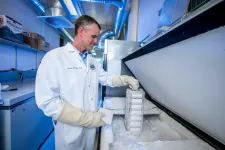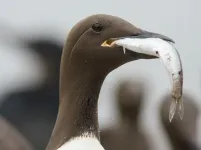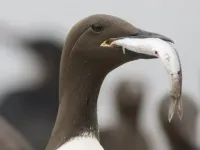Bacterium causing rabbit fever remains virulent for months in cold water
Study solves a long-term mystery, providing a plausible explanation for how Francisella tularensis can overwinter in the environment outside of a host
2021-05-27
(Press-News.org) Although it is not spread through human contact, Francisella tularensis is one of the most infectious pathogenic bacteria known to science--so virulent, in fact, that it is considered a serious potential bioterrorist threat. It is thought that humans can contract respiratory tularemia, or rabbit fever--a rare and deadly disease--by inhaling as few as 10 airborne organisms.
Northern Arizona University professor David Wagner, director of the Pathogen and Microbiome Institute's (PMI) Biodefense and Disease Ecology Center, began a three-year project in 2018 to better understand the life cycle and behavior of F. tularensis, funded through a $2.25 million grant from the U.S. Defense Threat Reduction Agency (DTRA).
One of the most puzzling behaviors of the pathogen is its ability to remain dormant, possibly in what is called a "viable but nonculturable" state--which means the bacteria is alive, but cannot be grown in the laboratory. That makes it much more difficult to study, because scientists can typically only study bacteria that can be cultured. Wagner's goal was to study the bacterium so as to determine the environmental and genetic factors that contribute to the pathogen's ability to apparently remain dormant for months at a time--a phenomenon that has remained mostly a mystery despite more than 100 years of research.
Now, Wagner and his collaborators have published their findings, "Long-Term Survival of Virulent Tularemia Pathogens outside a Host in Conditions That Mimic Natural Aquatic Environments," in the journal Applied and Environmental Microbiology. In the paper, the team shows how they were able to prove, by replicating environmental conditions in the lab, including low temperatures and low-nutrient water, that the bacterium can persist for months in cold water without any nutrients and remain fully virulent. Their results provide a plausible explanation for how it can overwinter in the environment outside of a host.
"We are making some very interesting discoveries in this project," Wagner said. "The main finding is that Francisella tularensis can persist in a dormant state for more than six months in cold water without any nutrients. This means it has the ability to persist in the environment outside of a mammalian host or arthropod vector. This was unexpected because many other bacteria that persist like that long-term in the environment form spores when they are outside of a host, such as Bacillus anthracis, the bacterium that causes anthrax forms spores, but F. tularensis doesn't do that. Others, like Yersinia pestis - the bacterium that causes plague - are always either in a mammalian host or a flea vector. F. tularensis has the ability to persist long-term in the environment long-term outside of a host without forming spores while remaining fully virulent."
"These study results have completely changed our perspective on the ecology of this bacterium. We now understand that mammals are likely just a small (but still important) aspect of its survival strategy. We now think that it spends most of its time in the environment outside of a host and only periodically causes disease in mammals. But those disease events in mammals are still very important as they serve to amplify the amount of F. tularensis that is deposited back in the environment."
Working with co-principal investigator Jason Sahl, associate professor and assistant director of PMI, and with PMI senior research scientists Dawn Birdsell and Joe Busch, Wagner conducted the study along with colleagues at two of the team's long-term collaborating institutions in Sweden: The Swedish Defence Research Agency and Umeå University.
Along with their Swedish collaborators, Wagner and his team are known worldwide for their work developing the phylogeny, or global family tree, of F. tularensis and its phylogeography--mapping where different groups of the species are found throughout the world and understanding the species' genetic diversity.
"As we continue with the DTRA research grant, we are now investigating the genes and proteins that regulate the ability of F. tularensis to persist in the environment outside of mammals and hosts. This work involves a number of current and recently graduated undergraduate students at NAU: former student Kathleen Soria, current students Natalie Hart and Rebecca Ballard, and current student and Flinn Scholar Kailee Savage.
Although the bacteria are naturally occurring throughout the northern hemisphere, including Arizona, the number of reported cases in the U.S. is small, with only 230 cases in 2016, three of which occurred in Arizona. Humans can be infected through insect bites; by drinking contaminated water, which happens in developing countries such as Turkey; by handling infected animals; and by breathing aerosolized particles containing the bacteria. Humans cannot transmit the disease to other humans. There is no vaccine to prevent the disease, which is treated with antibiotics. Wagner's team recently completed a related project funded by the DTRA studying the pathogen's antibiotic resistance.
INFORMATION:
About Northern Arizona University
Northern Arizona University is a higher-research institution providing exceptional educational opportunities in Arizona and beyond. NAU delivers a student-centered experience to its nearly 30,000 students in Flagstaff, statewide and online through rigorous academic programs in a supportive, inclusive and diverse environment. Dedicated, world-renowned faculty help ensure students achieve academic excellence, experience personal growth, have meaningful research opportunities and are positioned for personal and professional success.
[Attachments] See images for this press release:

ELSE PRESS RELEASES FROM THIS DATE:
2021-05-27
An estimated one in seven Ohio women of adult, reproductive age has visited a crisis pregnancy center, a new study has found.
In a survey of 2,529 women, almost 14% said they'd ever attended a center. The prevalence was more than twice as high among Black women and 1.6 times as high among those in the lowest socioeconomic group, found a research team from The Ohio State University. Their study appears in the journal Contraception.
Crisis pregnancy centers are often supported by religious organizations and are designed to discourage women with unintended pregnancies from choosing abortion, though they don't typically advertise themselves as anti-abortion. In Ohio, where more than 100 centers are spread throughout the state, they are funded by state dollars. In 2019, during ...
2021-05-27
Local management of coral reefs to ease environmental stressors, such as overfishing or pollution, could increase reefs' chances of recovery after devastating coral bleaching events caused by climate change, a new study finds. The results suggest that caring for reefs on a local scale might help them persist globally. When waters warm, corals can die quickly and en masse in coral bleaching events. Marine warming due to climate change has resulted in sharp increases in both the frequency and magnitude of these mass mortality events, which have already caused severe ...
2021-05-27
An exoskeleton can reduce the metabolic cost of walking not by adding energy or by recycling energy from one gait phase to another, as other exoskeletons have done, but by removing the kinetic energy of a striding person's swinging leg so they don't have to tense their muscles so much. Tested in ten healthy males, it also converted the extracted kinetic energy to useable electricity. Although humans are exceptional walkers, walking is metabolically expensive and requires more energy than any other activity of daily living. Exoskeletons and exosuits - wearable devices designed to work along with the body's musculoskeletal system - have been shown to reduce this cost by adding or recycling energy to assist the body's movement. These and other ...
2021-05-27
There is heightened public awareness that the world's oceans are under duress, with over-fishing and plastic pollution as some of the more tangible problems. Now, seabirds are calling attention to another problem and have delivered a warning message.
Serving as translators of the birds' message, an international team of 40 scientists led by William Sydeman at the Farallon Institute in northern California published findings on May 28 in the journal Science that some seabirds are struggling to raise young where the globe is most rapidly warming - in the northern hemisphere.
Using over 50 years of data from 67 seabird species across the globe, the team found ...
2021-05-27
In a study that uniquely evaluates marine ecosystem responses to a changing climate by hemisphere, researchers report that the fish-eating, surface-foraging bird species of the Northern Hemisphere suffered greater breeding productivity stresses over the last half-century than their Southern Hemisphere counterparts. The findings suggest the need for ocean management at hemispheric scales and underscore the importance of long-term seabird monitoring programs - some of which are already under threat - by illustrating the critical role that seabirds play as sentinels of global marine change. To date, global understanding of ocean change has not explicitly considered differences, ...
2021-05-27
Australian researchers recently reported a sharp decline in the abundance of coral along the Great Barrier Reef. Scientists are seeing similar declines in coral colonies throughout the world, including reefs off of Hawaii, the Florida Keys and in the Indo-Pacific region.
The widespread decline is fueled in part by climate-driven heat waves that are warming the world's oceans and leading to what's known as coral bleaching, the breakdown of the mutually beneficial relationship between corals and resident algae.
But other factors are contributing to the decline ...
2021-05-27
HOUSTON - (May 27, 2021) - One hundred fifty years ago, Dmitri Mendeleev created the periodic table, a system for classifying atoms based on the properties of their nuclei. This week, a team of biologists studying the tree of life has unveiled a new classification system for cell nuclei and discovered a method for transmuting one type of cell nucleus into another.
The study, which appears this week in the journal Science, emerged from several once-separate efforts. One of these centered on the DNA Zoo, an international consortium spanning dozens of institutions including Baylor College of ...
2021-05-27
Many seabirds in the Northern Hemisphere are struggling to breed -- and in the Southern Hemisphere, they may not be far behind. These are the conclusions of a study, published May 28 in Science, analyzing more than 50 years of breeding records for 67 seabird species worldwide.
The international team of scientists -- led by William Sydeman at the Farallon Institute in California -- discovered that reproductive success decreased in the past half century for fish-eating seabirds north of the equator. The Northern Hemisphere has suffered greater impacts from human-caused climate change and other human activities, like overfishing.
Seabirds include albatrosses, puffins, murres, penguins and other birds. Whether they ...
2021-05-27
A new paper, published recently in PLOS Computational Biology by a team including UMass Amherst researchers, seeks to help scientists structure their lab-group meetings so that they are more inclusive, more productive and, ultimately, lead to better science.
The word "scientist" might conjure images of lab-coated researchers tending bubbling beakers or building supercomputers, but an enormous amount of scientific work takes place around a conference table during weekly group meetings. "There is plenty of good research showing that diversity and inclusion make the science itself better," says Kadambari Devarajan, one of the paper's co-lead authors and a graduate ...
2021-05-27
The blood-brain barrier is impermeable to cholesterol, yet high blood cholesterol is associated with increased risk of Alzheimer's disease and vascular dementia. However, the underlying mechanisms mediating this relationship are poorly understood. A study published in the open-access journal PLOS Medicine by Vijay Varma and colleagues at the National Institute on Aging, part of the National Institutes of Health, in Baltimore, Maryland, suggests that disturbances in the conversion of cholesterol to bile acids (called cholesterol catabolism) may play a role in the development of dementia.
Little ...
LAST 30 PRESS RELEASES:
[Press-News.org] Bacterium causing rabbit fever remains virulent for months in cold water
Study solves a long-term mystery, providing a plausible explanation for how Francisella tularensis can overwinter in the environment outside of a host




